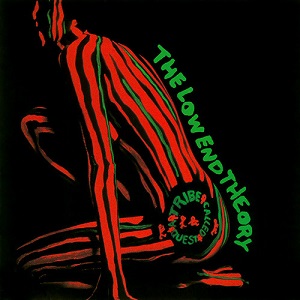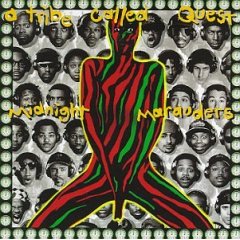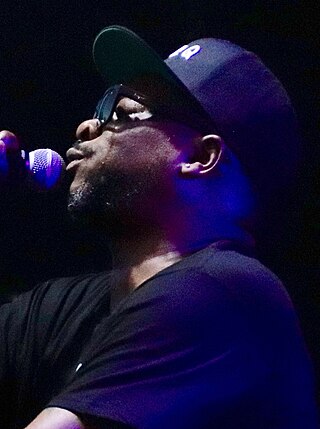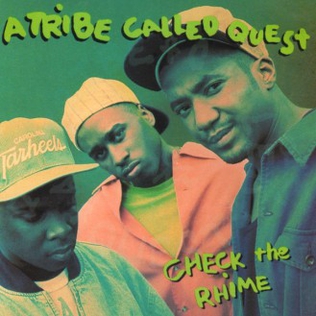
A Tribe Called Quest was an American hip hop group formed in Queens, New York City, in 1985, originally composed of rapper and main producer Q-Tip, rapper Phife Dawg, DJ and co-producer Ali Shaheed Muhammad, and rapper Jarobi White. Members of the Native Tongues collective, the group is regarded as a pioneer of alternative hip hop, influencing numerous hip hop and R&B musicians.

The Low End Theory is the second studio album by American hip hop group A Tribe Called Quest, released on September 24, 1991, by Jive Records. Recording sessions for the album were held mostly at Battery Studios in New York City, from 1990 to 1991. The album was primarily produced by group member Q-Tip, with a minimalist sound that combines bass, drum breaks, and jazz samples, in a departure from the group's debut album, People's Instinctive Travels and the Paths of Rhythm (1990). Lyrically, the album features social commentary, word play, humor, and interplay between Q-Tip and fellow member Phife Dawg.

Midnight Marauders is the third studio album by American hip hop group A Tribe Called Quest, released on November 9, 1993, by Jive Records. Recording sessions for the album occurred at Battery Studios, Platinum Island Studios and Scorcerer Sound in New York City. Its production was mainly handled by Q-Tip, with contributions from Skeff Anselm, Large Professor and the group's DJ, Ali Shaheed Muhammad. A culmination of the group's two previous albums, People's Instinctive Travels and the Paths of Rhythm and The Low End Theory, it features an eclectic, gritty sound based on jazz, funk, soul and R&B samples, in addition to socially conscious, positively-minded, and humorous lyrics.

Kamaal Ibn John Fareed, better known by his stage name Q-Tip, is an American rapper, record producer, singer, and DJ. Nicknamed The Abstract, he is noted for his innovative jazz-influenced style of hip hop production and his philosophical, esoteric and introspective lyrical themes. He embarked on his music career in the late 1980s, as an MC and main producer of the influential alternative hip hop group A Tribe Called Quest. In the mid-1990s, he co-founded the production team The Ummah, followed by the release of his gold-certified solo debut Amplified in 1999. In the following decade, he released the Grammy Award-nominated album The Renaissance (2008) and the experimental album Kamaal the Abstract (2009).

Malik Izaak Taylor, known professionally as Phife Dawg, was an American rapper and a member of the group A Tribe Called Quest with Q-Tip and Ali Shaheed Muhammad. He was also known as the "Five-Foot Assassin" and "the Five-Footer", because he stood at 5 feet 3 inches (1.60 m).

"1nce Again" is a song by the hip-hop group A Tribe Called Quest, released as the first single from their fourth album Beats, Rhymes and Life.

"Hot Sex" is a single by hip hop group A Tribe Called Quest. It was released in 1992 on the soundtrack for the film Boomerang and was later featured on European editions of the group's third studio album Midnight Marauders one year later in 1993. The track was also featured as a bonus track on the group's fifth album The Love Movement in 1998, and on the 1999 compilation album The Anthology.

Ventilation: Da LP is the debut studio album by the American rapper Phife Dawg, released in 2000. Though the album was not a commercial success, the singles "Bend Ova" and "Flawless" were minor hits. It was the only solo album released during Phife Dawg's lifetime.

"Jazz (We've Got)" is the second single from A Tribe Called Quest's second album The Low End Theory. The original material sampled in the song was provided by Pete Rock, and was then recreated in a similar way by Q-Tip. Although Pete Rock is not officially credited, Q-Tip credits him in the outro of the track, rapping "Pete Rock for the beat, ya don't stop."Rolling Stone lists "Jazz (We've Got)" on their list of 20 essential songs from the group. On their list of 10 lyrics that prove Phife Dawg's talent, Pitchfork included a rhyme from "Jazz (We've Got)": "Make sure you have a system with some phat house speakers / So the new shit can rock, from Bronx to Massapequa." The article notes that, "these kinds of stunt rhymes may not have been the most common component of Phife's lyrical arsenal, but they were usually the most 'oh shit' moments in any given verse, since they sounded so unexpected without really feeling forced."

Jarobi White is an American hip hop artist, chef, and a founding member of alternative hip hop group A Tribe Called Quest, alongside members Q-Tip, Phife Dawg, and Ali Shaheed Muhammad. He left the group after the release of their debut album, People's Instinctive Travels and the Paths of Rhythm in order to pursue culinary arts, before returning for their last album, 2016's We Got It from Here... Thank You 4 Your Service. In the early 2010s, Jarobi formed evitaN with Dres, formerly of Black Sheep. Their first album, Speed of Life, was released in October 2012.

"Stressed Out" is the second single from A Tribe Called Quest's fourth album Beats, Rhymes and Life. The song was produced by The Ummah and features Faith Evans on the chorus.

"Can I Kick It?" is a song by American hip hop group A Tribe Called Quest, released in October 1990 as the third single from their debut album, People's Instinctive Travels and the Paths of Rhythm (1990). The song, which has a call and response chorus, was recorded in 1989, when the band members were aged 18-19.

"Check the Rhime" is the first single from A Tribe Called Quest's second album The Low End Theory. The song was written by group members Phife Dawg, Q-Tip, and Ali Shaheed Muhammad. It was recorded at the legendary Greene St. Recording studio in New York City. The song peaked at number 59 on Billboard on November 16, 1991. Rolling Stone listed "Check the Rhime" as one of the group's 20 essential songs, noting that Phife Dawg "quickly proves himself Q-Tip's lyrical equal."

"Oh My God" is the third single from A Tribe Called Quest's third album Midnight Marauders. The song contains a sample of "Who's Gonna Take the Weight" by Kool & the Gang. It also features Busta Rhymes on the chorus. Rolling Stone magazine included "Oh My God" on their list of 20 essential A Tribe Called Quest songs, noting "It's not easy to listen to Phife boast 'When's the last time you heard a funky diabetic?' now that the disease has taken his life. But that line also sounds fiercer and more defiant than ever."

"Buddy" is the third single released by De La Soul from their album 3 Feet High and Rising.

Linden Boulevard is a boulevard in New York City. Its western end is at Flatbush Avenue in Brooklyn, where Linden Boulevard travels as an eastbound-only street to Caton Avenue, where it becomes a two-way street. The boulevard stretches through both Brooklyn and Queens. This boulevard, especially the area of Cambria Heights between Springfield Boulevard and the Nassau County line represents a smaller version of shopping centers located on Jamaica Avenue and Queens Boulevard. Linden Boulevard also continues into Nassau County to Valley Stream where it turns into Central Avenue; this was one of several former names of the street in Queens.
Konee Rok is an American music video and documentary director. He has done film and video work with many popular artists in hip-hop, rap music and break dancing culture.

"We the People...." is a song by American hip hop group A Tribe Called Quest, and the first single from their sixth and final album, We Got It from Here... Thank You 4 Your Service. Produced by Q-Tip and co-produced by Blair Wells, the song contains a sample of the drum break of "Behind the Wall of Sleep" by Black Sabbath. The chorus of the politically-charged song parodies Donald Trump's presidential campaign. "We the People...." was critically acclaimed and included on several year-end lists by publications.
"The Space Program" is a song by American hip hop group A Tribe Called Quest, from their sixth and final album, We Got It from Here... Thank You 4 Your Service. Produced by Q-Tip and co-produced by Blair Wells, it is the opening track on the album, and includes posthumous vocals by group member Phife Dawg, who recorded the song with the group before his death in March 2016. Praised as the "triumphant return of the Tribe", it is a political hip hop song that addresses gentrification and racism in the United States.

Forever is the posthumous second studio album by American rapper Phife Dawg. It was released on March 22, 2022, the sixth anniversary of his death, by Smokin' Needles Records and AWAL. It features guest appearances by his bandmate Q-Tip, Busta Rhymes, Maseo and Posdnuos of De La Soul, Dwele, Angela Winbush, Redman, Illa J, and Little Brother, among others. The album was mostly complete at the time of Phife Dawg's death, and was later completed by his business partner and collaborator, DJ Rasta Root.

















